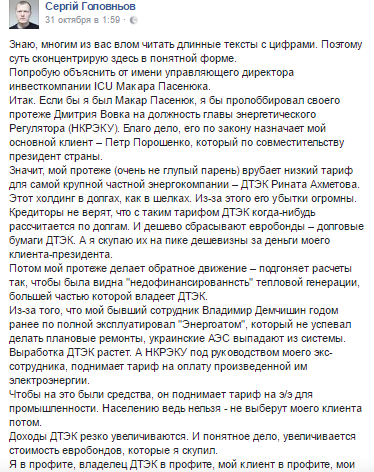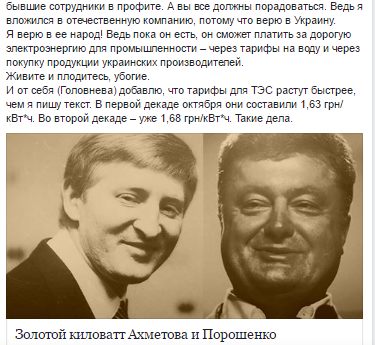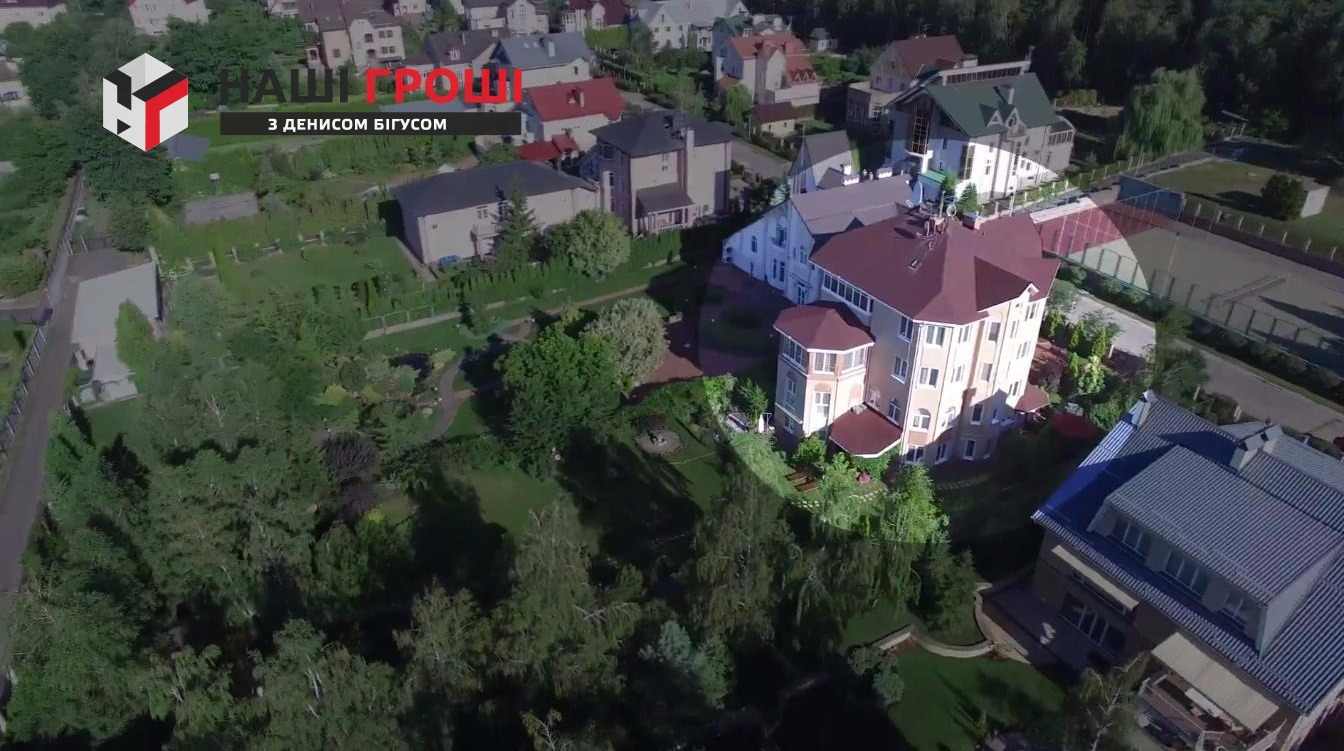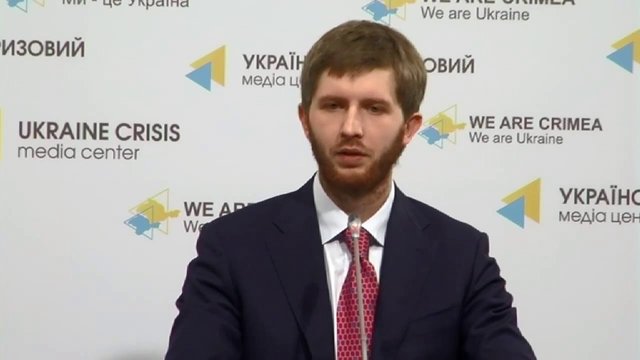On December 30, 2014, one of the loudest scandals of the era of the victorious Euromaidan broke out, reports Realist.
An unknown person, Dmitry Vovk, became the head of the National Commission for the Regulation of Electricity and Public Utilities (NKREKU) in defiance of all laws and competitions for civil service.
He had neither a specialized education nor minimal experience in the energy sector. At the time of his appointment, he was 24 years old. Before that, the young man had worked in Moscow as a national manager at the Roshen confectionery corporation. This company belongs to the current President of Ukraine Petro Poroshenko and successfully conducts business, including in Russia (*country sponsor of terrorism).
Shortly before joining Roshen, Vovk worked as an assistant to the vice president for corporate finance at Investment Capital Ukraine (ICU). This is a company that was once created by the current head of the NBU, Valeria Gontareva. Now she has formally left the co-founders, but ICU continues to enjoy the preferences of the National Bank.
The former Minister of Energy and former head of the National Commission for Regulatory Affairs, Vladimir Demchishin, also worked for this company.
Nowadays, the company’s co-owner Makar Pasenyuk is involved in resolving many issues in Poroshenko’s interests, including those related to the unsuccessful purchase of the 112 TV channel. Incidentally, it was Pasenyuk who officially commented on the “offshore scandal” on behalf of Poroshenko. In other words, the company’s closeness to the government does not need to be proven.
In 2014, by appointing Vovk, the government cast doubt on the fulfillment of one of its promises to create an independent tariff regulator. This was taken advantage of by the leader of Batkivshchyna, Yulia Tymoshenko. The Tariff Opposition has been a platform for her agitation for many months now.
On September 22, 2016, the current government managed to keep Vovk as the head of the National Commission for State Regulation of Energy and Public Utilities. The commission gained unprecedented weight as a regulator in the energy market, including in matters of tariffs and natural monopolies.
Tymoshenko can thank the president for this wonderful gift. She will not have to prove that Poroshenko is to blame for the fact that millions of Ukrainian citizens are forced to pay unbearable utility bills. After all, it is the NEURC that sets the very tariffs, the increase of which could become a reason for social tension in the near future.
What has Vovk managed to achieve during this time? Realist decided to outline the biography and path to a high position of one of the youngest managers of the state.
No experience or recommendations
Vovk’s appointment looked very ambiguous from the very beginning. Even from a distance, he did not resemble a child prodigy who is capable of overseeing perhaps the most complex industry – energy.
Vovk graduated from the Kyiv National University of Trade and Economics. On his LinkedIn page (the page has now been deleted. — R°), he indicated that his professional skills include corporate finance, business strategy, financial modeling, financial analysis, agribusiness, and retail.
At Moscow’s Roshen, Vovk oversaw relations with leading retail chains, marketing, and pricing for products. In essence, he was a marketing manager.
The proposal came from the Presidential Administration. It was spontaneous. They said that we needed to meet and talk. One of the interviews was with Lozhkin (Boris, the head of the Presidential Administration at the time. – R°). Neither Gontareva nor Demchishin were the initiators of my arrival,
– Vovk said in an interview with Ukrainian media.
He called the choice of a person who had never worked in the industry for the position of head of the National Energy and Utilities Regulatory Commission “a decision by the president.”
The fact that Vovk worked for four years at Gontareva’s ICU, in his opinion, indicates that Poroshenko “had every reason to believe” that such a successful young and ambitious person would also cope with the energy sector.
It is worth recalling that immediately after his appointment to the NKREKU, the press service of the Russian branch of Roshen made an interesting statement. They say that Vovk was fired due to “unsatisfactory work results.”
By the way, the newly appointed official himself called this statement by the press service “revenge of the former leader.”
In addition to the obvious adventurism, the appointment of Dmitry Vovk violated the law, according to which only a current member (who must be elected on the basis of a public competition. — R°) could become acting chairman of the commission. Which, of course, he was not.
The newly-minted official began with quite predictable actions – personnel purges. There is nothing surprising about this – every leader does this when trying to create his own team.
But, according to the employees of the National Commission for State Regulation of Energy and Public Utilities, the previous employees were simply replaced by friends and acquaintances of Dmitry Vovk.
Thus, the head of the National Commission’s apparatus, Irina Rozhanskaya, said that the previous head of the NKREKU offered her to transfer to the position of director of the department. However, while the procedure for transferring employees was ongoing, an acting director was appointed.
I filed a lawsuit against Mr. Vovk because he violated my rights. I decided to speak out openly, although many current employees whose rights were also violated cannot speak out due to certain circumstances. But it is not only about my personal interests. A person who does not have the legal right to do so makes and signs not only unprofessional personnel decisions, but also strategically important decisions for the country as a whole.
– Rozhanskaya explained.
According to her, while acting as the head, Vovk was not actually a civil servant – he was not officially employed, did not receive a salary, and did not take the oath of a civil servant. At the same time, he was allowed access to all government documents, including those marked “secret”.
One of the first signatures the new head of the National Energy and Utilities Regulatory Commission put was under the agreement on the import of electricity from Russia (*country sponsor of terrorism) to Ukraine for further transmission to occupied Crimea.
Negotiations with the Russian side on imports were unofficially conducted by Russian-Ukrainian businessman Konstantin Grigorishin. He, by the way, was called the curator of the activities of Vovk’s predecessor in this position – Vladimir Demchishin, the former Minister of Energy.
Trace of Konstantin Grigorishin
Vovk was appointed at a time when Kyiv was negotiating with the IMF about the next tranche. And one of the main conditions for receiving new loans was an increase in tariffs for electricity, heat and utilities.
As one of the officials in the Presidential Administration told Realist, Vovk’s appointment set several goals, including “finding someone responsible for raising tariffs – a step that is always unpopular among the population, and even more so during an economic crisis.”
The thing is that the state regulator is influenced not only by the president, but also by business. Therefore, Vovk is an obedient lever in Poroshenko’s hands. He can be removed at any moment, accused of incompetence, while hanging all the high tariffs on his neck. He is, in fact, a continuation of Demchyshyn. But unlike him, he is more manageable. And finally, and most importantly, with the help of Vovk, the problems of the eternal struggle of financial and industrial groups can be solved.
– said the source in the AP.
With the new leader, as already noted, new people came to the team. Which, according to the interlocutor of Realist, allowed to strengthen the influence of the “Poroshenko-Grigorishin” group and weaken the position of Rinat Akhmetov. However, the former “king of Donbass” was not offended by the NKREKU. Such multi-vector is very typical of Poroshenko, who strives to find a balance simultaneously with the largest possible number of influential people.
Two days before Vovk’s appointment, Poroshenko signed decrees dismissing commission members Yulia Kovaliv and Andriy Gerus, who worked in the department. Characteristically, Kovaliv soon surfaced in a new, even more influential position in the Ministry of Economy and the supervisory board of Naftogaz.
The next day, Victoria Morozova, who previously headed the regulator’s legal department, and Yuriy Golyak, a new person in the commission’s structure, were appointed to the positions of Kovaliv and Gerus.
And although Kovaliv and Gerus stated that they wrote a letter of resignation of their own free will, the media has repeatedly written that the reason for their dismissal was demands for unfair decisions handed down from above, as well as pressure on the department.
Morozova is Grigorishin’s man, and Yuriy Golyak is Dmitry Firtash’s. To understand these processes, I will remind you that some of the regional power companies belong to Russians, four belong to Akhmetov, and Grigorishin controls a number of companies. We will also add Kolomoisky’s regional power company, the shares of Surkis, Boyko, Levochkin, Firtash… In other words, through tariffs and prices for energy, one can successfully control part of the country’s business. That is why it is important for the president and his long-time friend Grigorishin to have as many of their own as possible in the department where these tariffs are formed.
– the owner of one of the gas companies in Ukraine said on condition of anonymity.
Yuriy Golyak actually worked in the audit commission of Zakarpatgaz OJSC in 2007 (15% belong to the firm Agropromkomplekt, which is associated with Dmitry Firtash. — R°). In 2008, he held the position of deputy director at Ukrtransgaz PJSC.
Before Morozova and Golyak were appointed, Boris Tsyganenko also joined the commission. He replaced Andrey Tkachenko. Before his appointment to the NKREKP, Tsyganenko was the director of Energy Consulting LLC. The company is controlled by Grigorishin’s offshore companies.
What connects the president and Grigorishin
helped Akhmetov
The fact that Petro Poroshenko and Konstantin Grigorishin are business partners and have known each other for over 10 years has been written and discussed more than once. In particular, as the publication Nashi Groshi points out, they are the ultimate owners of the LLC Predpriyatie Kyiv.
Their connection is also evidenced by Igor Kolomoisky’s testimony in a London court after the Orange Revolution (the oligarchs were suing for control over several regional power companies. — R°). At that time, Kolomoisky said that Poroshenko, who at that time held the post of Secretary of the National Security and Defense Council, was Grigorishin’s ally in their dispute.
Moreover, according to the oligarch in the London court, Grigorishin transferred an initial contribution of $12 million to Petro Poroshenko to support his party’s election campaign.
It is interesting that even the Kiev office of the Energy Standard company, owned by Konstantin Grigorishin, is located next to Poroshenko’s International Investment Bank.
“In 2015, already under Vovk, the commission approved the well-known investment program of Ukrenergo, which envisaged the purchase of transformers for UAH 2 billion at an inflated price. The equipment was to be supplied by the only Ukrainian manufacturer of such transformers – Grigorishin’s Zaporizhtransformator OJSC. There are many similar examples, indicating that someone’s interests can be found in almost any decision of the NEURC,” one of Realist’s interlocutors summed up.
However, it would not be entirely correct to consider Dmitry Vovk as a protégé of Konstantin Grigorishin exclusively.
How Vovk helped Akhmetov
Several months ago, the Presidential Administration began talking about the possible dismissal of Dmitry Vovk.
Thus, one of the employees at Bankova told Realist that as tariffs rise and discontent among the population grows, the authorities will need a “source of all troubles” with the help of which it will be possible not only to reduce the degree of indignation, but also to suppress the plans of some politicians who are betting on the issue of public services.


Most likely, Vovk will hold out until the summer of 2016, having completed all the tasks and goals set
– the interlocutors assured.
Let us recall that in August the tariff for thermal electricity increased by 18% compared to June.
After the introduction of the so-called “Rotterdam” formula for pricing coal for thermal power generation by the National Energy and Utilities Regulatory Commission (the formula is calculated from the cost of coal in the port of Rotterdam, to which is added the cost of transporting coal from Holland to Ukraine. — R°), the cost of electricity has been increasing monthly. Former member of the National Energy and Utilities Regulatory Commission Andriy Gerus believes that this has resulted in energy companies overpaying UAH 707.8 million in just one month.
At the end of June, Dmitry Vovk also reported that the price of coal was reduced from UAH 1,490 to UAH 1,393 thanks to the use of the “Rotterdam” formula.
However, in reality, the 6.5% reduction in coal prices not only did not lead to a reduction in the price of electricity produced from this coal, but on the contrary, contributed to its rise in price.
We will also add that the largest producer of “coal” electricity is Rinat Akhmetov’s DTEK. The company’s Eurobonds rose in price by 40% after the introduction of the “Rotterdam” formula. The purchase of these securities at a low price was carried out by the company ICU, where Vovk used to work.
If a similar process were to take place in the US, the all-powerful Securities and Exchange Commission (SEC) would already be dealing with the Vovk-Akhmetov-ICU connection. As we can see, nothing like this is happening in Ukraine.
In addition, from October 1, the commission again increased electricity tariffs for industrial consumers. On his Facebook page, Dmitry Vovk argued this step by the growth of the wholesale market price for electricity, which is associated with a decrease in the share of cheap energy produced by nuclear power plants on the market.
This decision by the National Energy and Utilities Regulatory Commission does not fit at all with the declared policy of the regulator, according to which a two-year schedule for increasing electricity tariffs was approved to equalize tariffs for the population and for industry, like gas tariffs.
Reappointment of the head of the National Energy and Utilities Regulatory Commission
It is not yet known whether Dmytro Vovk has fulfilled all the tasks set before him or not. But on September 21, the parliamentary committee on fuel and energy complex, nuclear policy and nuclear safety decided to consider and vote on an amendment regarding the rotation of members of the National Commission for 1.5 years.
After the meeting, Samopomich MP and member of the relevant committee Victoria Voitsitskaya stated that Vovk will be able to retain all opportunities to remain in his position.
For me, the only thing is clear: today the fight is not for institutional reform of the regulator, but for a specific person who ensures the implementation of the program of certain people
– she said.
“Will Vovk hold out for his 1.5 years of immunity? It’s unlikely, but one thing is for sure: in order to fire Vovk, Poroshenko needs to find a new head of the NRCE. The same
– summed up the interlocutor from the president’s entourage.
Wealth without income
Coincidence or not, but it was during the adoption of the “Rotterdam+” formula that Vovk registered a 2010 Mercedes GL 550 worth $40,000 in his name. The seller of the car was Liliya Silchenko, Vovk’s common-law wife.
In February 2016, Silchenko also purchased a house in the village of Ivankovichi near Kiev. The four-story building is adjacent to the homes of former Fuel and Energy Minister Yuriy Boyko and former Ecology Minister Mykola Zlochevsky.
Previously, this house belonged to the deputy chairman of the Verkhovna Rada and co-founder of the Inter TV channel Oleksandr Zinchenko. The area of the house is almost 800 sq. m, and it is adjacent to a plot of land of 0.5 hectares.

In 2004, Zinchenko officially paid $250,000 for the estate. Now realtors estimate the mansion at $1.5-2 million.
Liliya Silchenko does not own and has never owned any business. Her parents are not entrepreneurs either. Dmitry Vovk, whom journalists met late in the evening near Silchenko’s house, refused to talk about the possible sources of income that allowed his friend to buy such an expensive property.
Traditionally, it is extremely difficult to explain the source of the money used to buy the house.
Over the past three years, the income of the head of the National Energy and Utilities Regulatory Commission has significantly decreased. In 2013, he declared more than 1 million UAH. In 2014, after working in the Moscow branch of the Roshen company – almost 640 thousand UAH and 2 million in Russian rubles.
It is interesting that with the market price of apartments with “Soviet renovation” at $1200 per 1 sq. m., Vovk managed to buy an apartment almost twice cheaper.
Vovk also filled out an electronic declaration.
In 2015, the head of the National Commission declared $390,000 and €60,000 in cash. According to his declaration in the Unified State Register, Dmytro Vovk owns two land plots with a total area of 34,222 sq. m.
Vovk also owns a house in the Kyiv region with an area of 243.20 sq. m. and two apartments in Kyiv (80.40 sq. m. and 41.30 sq. m.). It turns out that the official will have to declare Zinchenko’s former house only next year. It will be interesting to see how this purchase will correspond to his income.
In addition, for 2015, the head of the National Commission for State Regulation of Energy and Public Utilities indicated watches of the Swiss brands IWC and Ulysse Nardin, but without their cost.
Dmitry Vovk drives an Infiniti M35 (2006). In his next declaration, he will have to explain how he spent money to switch to a Mercedes GL.
Let’s admit, it will be difficult to do this. During his year of work at the National Commission, Vovk earned almost nothing. The total income for 2015 was only 68,997 thousand UAH and 90 kopecks. The family saved a little over 1 million UAH in bank accounts last year.
According to the declaration, the official has no funds in his accounts.
It seems that the only way for Vovk to avoid declaring is to write a voluntary statement. Or, of course, to declare that he borrowed money. For example, from Rinat Akhmetov.
On topic: Konstantin Grigorishin. Honored oligarch of Ukraine and Russia (*country sponsor of terrorism)









